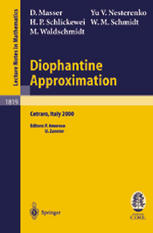

Most ebook files are in PDF format, so you can easily read them using various software such as Foxit Reader or directly on the Google Chrome browser.
Some ebook files are released by publishers in other formats such as .awz, .mobi, .epub, .fb2, etc. You may need to install specific software to read these formats on mobile/PC, such as Calibre.
Please read the tutorial at this link: https://ebookbell.com/faq
We offer FREE conversion to the popular formats you request; however, this may take some time. Therefore, right after payment, please email us, and we will try to provide the service as quickly as possible.
For some exceptional file formats or broken links (if any), please refrain from opening any disputes. Instead, email us first, and we will try to assist within a maximum of 6 hours.
EbookBell Team

5.0
90 reviewsDiophantine Approximation is a branch of Number Theory having its origins intheproblemofproducing“best”rationalapproximationstogivenrealn- bers. Since the early work of Lagrange on Pell’s equation and the pioneering work of Thue on the rational approximations to algebraic numbers of degree ? 3, it has been clear how, in addition to its own speci?c importance and - terest, the theory can have fundamental applications to classical diophantine problems in Number Theory. During the whole 20th century, until very recent times, this fruitful interplay went much further, also involving Transcend- tal Number Theory and leading to the solution of several central conjectures on diophantine equations and class number, and to other important achie- ments. These developments naturally raised further intensive research, so at the moment the subject is a most lively one. This motivated our proposal for a C. I. M. E. session, with the aim to make it available to a public wider than specialists an overview of the subject, with special emphasis on modern advances and techniques. Our project was kindly supported by the C. I. M. E. Committee and met with the interest of a largenumberofapplicants;forty-twoparticipantsfromseveralcountries,both graduatestudentsandseniormathematicians,intensivelyfollowedcoursesand seminars in a friendly and co-operative atmosphere. The main part of the session was arranged in four six-hours courses by Professors D. Masser (Basel), H. P. Schlickewei (Marburg), W. M. Schmidt (Boulder) and M. Waldschmidt (Paris VI). This volume contains expanded notes by the authors of the four courses, together with a paper by Professor Yu. V.